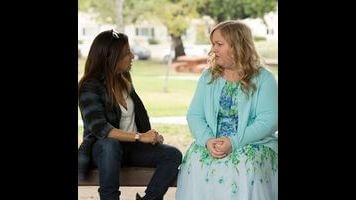There were two connections between the larger setpieces in this episode, one is more overt than the other. Sam feels her own problems so deeply because she is embroiled in them. She fights with Max and deals with Duke’s scheduling so she feels this weight, while essentially blind to the problems of others because of her disconnect to the situation. Trinity (Sarah Baker, of the fantastic Louie episode “So Did The Fat Lady”) exudes perfection (even if that only comes from Sam’s notions of her) and judgment so Sam can’t empathetically understand why Trinity acts the way that she’s acting, nor understand that just as much as she sees Trinity as judgmental, Sam is judgmental in her own right. She assumes that Trinity hates gay and black people, when the only evidence she has to back that up is Trinity’s religion. And, as Sam learns at the end, that’s not really the case.Sam revels in the chaos of life, knowing that it is inevitable, while Trinity is forced to hold it at bay. Her marriage is in trouble, her daughter has issues, but she can’t even admit to Sam she needs helps with childcare. They both have issues with the way they live their lives, but neither one thinks the other one is doing the right thing either.
What I found interesting about this episode is how Sam gets caught up in aggressive situations that are entirely built on perspective. When Sam picks up Max at the beach, she is making out with a dude and Sam is pissed. You wanted me to see this, Sam says, you wanted to hurt me. This is the final insult after Max has berated Sam for not letting her charge cab rides to the familial Lyft account, tells Sam she hates her, guilts Sam into picking her up from the beach (“It’s getting dark mom, I could get raped”), and then fights with her supposed savior all the way home. During Max’s declaration of hate, Sam tells Max her words don’t mean anything anymore. They’re just words. “If you really want to upset me, you need to come up with something new,” Sam says. “Ok, how about this? You’re short and you’re getting old,” Max retorts. When Sam starts to cry (“It’s like you’re fighting me every second and I don’t even know what surrender looks like. I really don’t.”), Max comes right back at her. The power has been diffused. This is simply how they interact as mother and daughter. It’s not the healthiest, but at church on Sunday, they’re a team again, bonding over Max’s midriff-baring shirt that flagrantly going against the standards of the church. Their fighting is their outlet. This scene was a near perfect encapsulation of a mother-daughter teenage relationship. The constant push and pull that never seems to be in sync.
But Trinity doesn’t have that same outlet. When Sam lays into her, Trinity can’t handle it. “I was just titting your tat over here,” Sam says. Isn’t this how you do it? Don’t you speak this language too? But Trinity can’t. Each woman looks down on the other, but each woman has their own faults that they can acknowledge to themselves but have trouble acknowledging to each other.
There were two low-key great performances in this episode. Baker, who has proven herself an MVP in the aforementioned Louie episode, doesn’t play Trinity over the top. She could be a over the top caricature — and she, nor Morgan, are free of these quirks — but instead she grounds Trinity, especially when explaining her viewpoint on the world. She’s going up against Sam, a woman we’ve been conditioned to like over the course of the series, but she still comes off as reasonable, even if she does let her young daughter watch CSI. Y’know, because they’re based off of real stories. Then there’s Olivia Edwards who plays Duke. Mikey Madison (Max) and Hannah Allgood (Frankie) by nature of their ages have more interesting characters. But everything that Edwards did tonight cracked me up, especially when she stood on the choir riser and couldn’t even manage to lip sync along her schoolmates. She failed at choir, and if the adults that surround her are any indication, she will continue to fail at many other things and that’s ok.
Stray observations
- Pamela Adlon is fabulous in that she can deliver certain lines and land them in a way few others could. Namely this one exchange: “Looks like the feeling’s not mutual.” “No, no, she’s just racist.”


 Keep scrolling for more great stories from A.V. Club.
Keep scrolling for more great stories from A.V. Club.